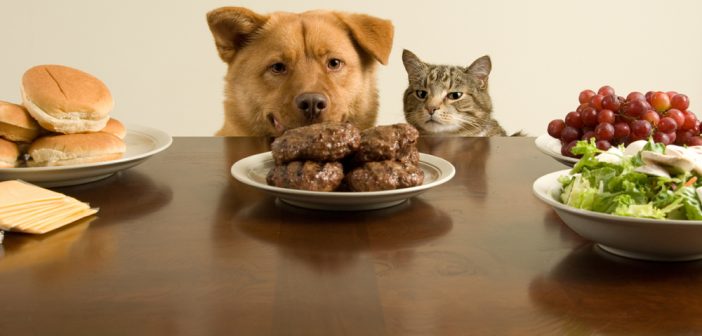Being a pet owner, you probably do not mind sharing your food with your cat or dog, especially when they stare at what you are eating with their big, woeful eyes. Nonetheless, this habit could pose a health risk for your furry friends. Some pet owners do not realize that there is a wide assortment of human foods that would be extremely detrimental to their pets. Thus, they end up feeding them these foods, which can lead to a medical emergency or worse yet, death. For the sake of your pet’s well-being, below are some of the foods that cats and dogs should never eat.
Uncooked fish
Sushi may be okay for humans but do not be so quick to feed raw fish to your cat or dog. A little-known fact about uncooked fish is that it could contain a parasite that causes what is aptly named “fish disease.” This parasite is particularly common in up-streaming species of fish such as sturgeon, salmon, and trout. Therefore, if you like to take your dog with you fishing or if you regularly prepare fish at home, ensure that your pet is not eating any bits that you are throwing in the trash.
Fatty foods
Pets are just as fond of fatty foods as humans are! Whether it is a tasty cheeseburger or some bacon strips, you can be assured your pet will approach you with its tail wagging in anticipation of a treat. However, do not give in to your pet. Although fatty foods are not particularly toxic, they can severely disrupt the digestive system of your pet. As a result, once they eat the food they could develop severe gas, diarrhea, and vomiting. If your pet eats fatty foods on a regular basis, they are highly susceptible to developing gastrointestinal problems as well as pancreatitis.
Bones and trimmings
You have decided to make a roast, whether chicken, beef or lamb and proceed to prep your meat by trimming away the fat and deboning it. During this process, it is quite easy to treat your dog with these trimmings rather than them going to waste in the bin. However, you will be posing a health risk for your pet. Sharp or splintered bones could end up tearing your pet’s internal organs, leading to internal bleeding. Fat trimmings, on the other hand, can bring the onset of liver and pancreatic problems.
XylitolNot many pet owners may be aware of what xylitol is, but it is one of the ubiquitous ingredients in a vast array of foods. Xylitol is primarily used as an artificial sweetener in toothpaste, chewing gum, candy and more. Although entirely harmless to humans, xylitol is unsafe for dogs. When dogs ingest it, the xylitol causes a surge of insulin in their body. This increased insulin will lead to the development of low blood sugar (clinically referred to as hypoglycemia). Left unchecked, your dog can suffer from permanent liver damage. Some of the signs of the symptoms of xylitol poisoning include uncoordinated movements in your dog, extreme lethargy, and vomiting.
Chocolate
The one thing to note about chocolate is that it contains a chemical known as theobromine. In large amounts, theobromine is toxic to dogs. Another chemical harmful to pets contained in chocolate is caffeine. Theobromine and caffeine levels would vary in different types of chocolate. For instance, darker chocolate will have higher quantities of these chemicals than milk chocolate. Nonetheless, the size of the dog also matters as a small amount of chocolate may not affect a larger dog but could be highly toxic to smaller dogs. Symptoms of chocolate toxicity include diarrhea, the onset of vomiting, muscle tremors, rapid heart rate and even seizures Depending on how severe the toxicity is, within a day of ingestion death could occur. Therefore, it is prudent to keep any chocolate infused foods away from your pet.
Bread dough
Bread is relatively harmless to pets once it is cooked, but the raw dough can cause serious health issues in your pet. The yeast contained in the dough will lead to stomach expansion if ingested when raw. Although bloating is merely uncomfortable in humans, in dogs and cats the bloating can quickly become fatal. In addition to this, when the yeast is ingested by your pet, it starts to produce alcohol. This alcohol production can lead to the fatal intoxication of your pet.
Raisins and grapes
Fruits may be chock full of vitamins, but some varieties can be toxic to your pets. Raisins and grapes have been known to cause acute kidney failure in both dogs and cats. Although the reason for this is not clinically determined, the symptoms of kidney failure tend to present themselves in a relatively short span of time. If your pet starts to exhibit lethargy, diarrhea, and vomiting, chances are they may have ingested grapes or raisins. It is crucial to seek immediate veterinary care, as kidney shutdown would lead to death.
Onions and garlic
Onions and garlic are some of the most commonly used cooking ingredients. However, what some pet owners do not realize is how toxic they could be to their cats and dogs. Onions and garlic contain compounds that can cause severe damage to the red blood cells of your pets. Once these red blood cells have been compromised, they become incapable of transporting oxygen efficiently and become at risk of rupturing. It should be noted that cooking these ingredients does not make them less harmful to your pet. Thus, you should take measures to ensure your pets are not exposed to them in their food.
Salt
Salt is a seemingly harmless condiment used in almost everything savory. Thus, not many people may be aware that salt poisoning is an actual medical condition that your pet can develop. Although you can feed your pet salty foods moderately, you need to pay particular attention if you take your pet to the beach with you. Drinking too much salty water can lead to neurological problems such a swelling of the brain as well as seizures.









